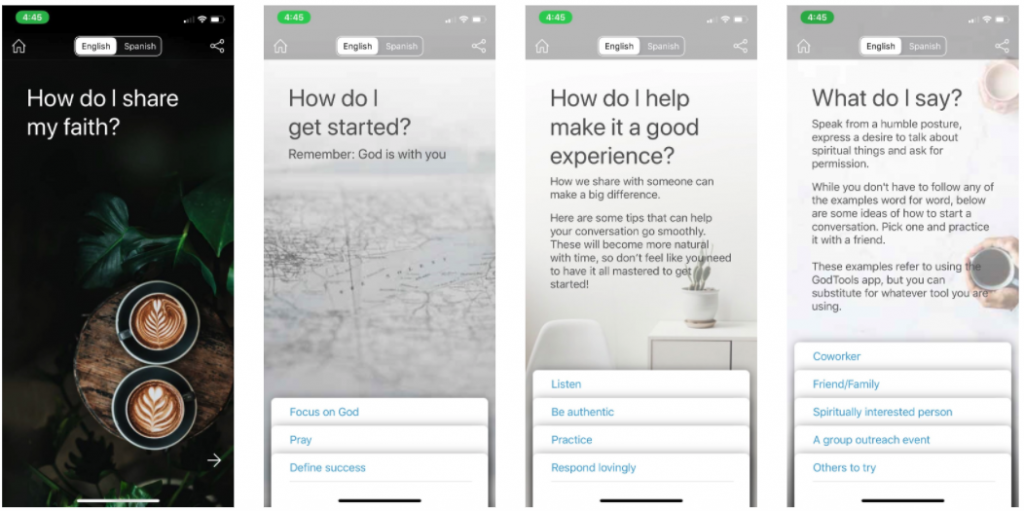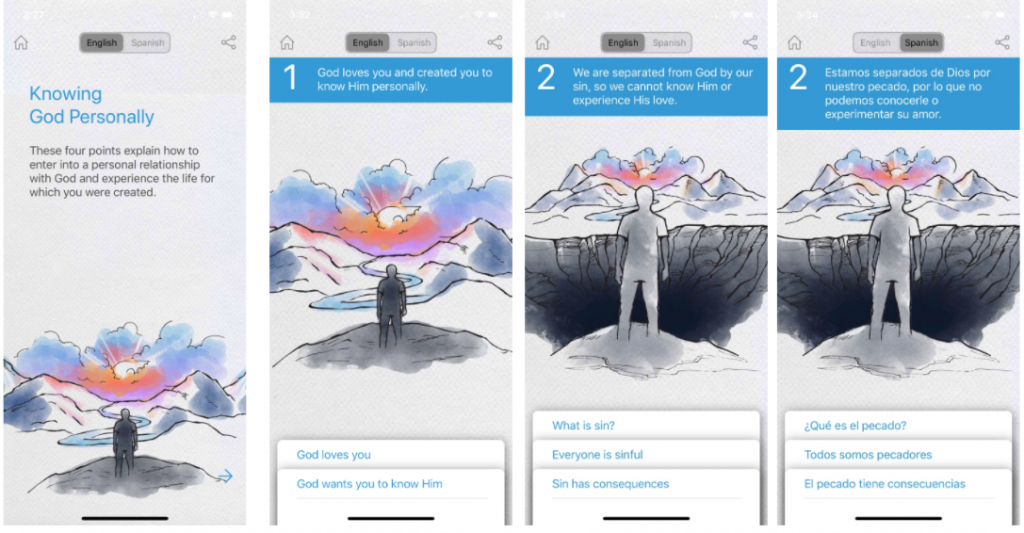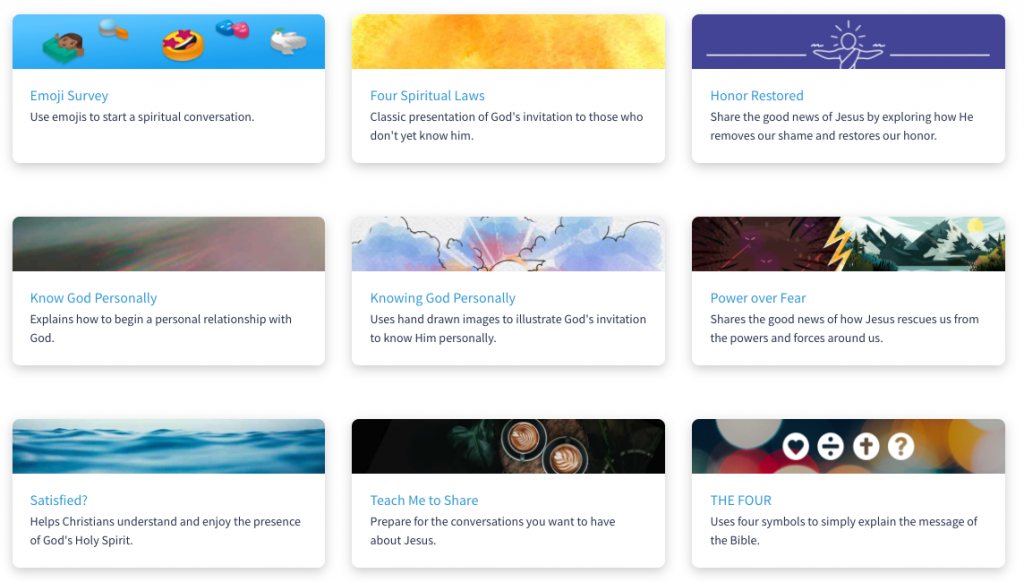One of the obstacles that keeps many Christians from sharing their faith is not knowing how to transition a conversation into a clear Gospel presentation. For those not used to such conversations, it can be intimidating and confusing, not knowing how to start or on what areas to focus. That obstacle is the problem the GodTools app is trying to solve.
Recently Stephanie Flores, a missionary with Bridges International, spoke at an Indigitous Digital Outreach Workshop to share how to use GodTools to have a conversation about Jesus. The webinar series is part of Indigitous’s partnership with GO 2020, where we have a collective goal of mobilizing 100 million believers to reach 1 billion people with the Gospel in the month of May.
God can use all things for good, but we must open our eyes to see the opportunity. “I tell you, open your eyes and look at the fields! They are ripe for the harvest,” Jesus says in John 4:34. Stephanie believes that the COVID-19 pandemic has created a great opportunity for those who are able to see the fields. “We were busy and now God has us at home and has us seeing with new eyes this opportunity of people that are open, that are really seeking, that are really hungry and curious about what life is about, and thinking about death, and all of these questions that maybe they hadn’t thought about before,” she says.
The Power to Share
During the workshop, Stephanie talks about the power to share the Good News, providing a simple equation:
Understanding + Prayer + Spirit = The Power to Share
Understanding: First, you must understand your audience. With whom are you connecting? If it’s a one-time connection with your Uber driver, the conversation will be much different than if it’s a family member or longtime friend. What are their beliefs? What are their struggles? “This is a great time to be listeners,” Stephanie says, to hear the hearts of people, what questions they have, and what issues are affecting them.
Prayer: Our abilities are limited, but God’s are not. There are three key ways to pray in this situation. First, pray for the person with whom you want to share. Perhaps make praying for them part of your regular routine. You can also pray with them for things that they care about, such as their financial situation or anxiety. Most people, whatever their beliefs, won’t reject a request to pray with them. You can also pray for them with other people, mobilizing Christian friends, your church, or family to lift them up in prayer. “Prayer is a powerful tool that God has given us in access to Him,” Stephanie says.
Spirit: The Holy Spirit knows that person you want to reach better than you do. Not only that, but it is only the Spirit that can change their heart and bring them to God.
Teach Me to Share

GodTools currently has 10 different tools in 84 languages. One of the tools is Teach Me To Share, which provides practical tips and perspective to help you gain the confidence to initiate a Gospel conversation, including providing prompts for different types of people with whom you might want to share.
One key for those who are new to sharing their faith is to embrace awkwardness, Stephanie says. If you share your faith enough, you’re guaranteed to have an awkward moment because of it. Chances are, your first time sharing will be akward, but what do you really have to lose? And how can that compare with the reward of someone’s salvation? “If you went out to the best restaurant in town and you had the best meal, what would you do? You would go and tell everyone, ‘you have to try this!’” Stephanie says. “The Good News of Jesus is so good that we have to share it, and the people that we love are going to see that inside of us.”
Knowing God Personally

After explaining her philosophy on evangelism and some of the tools that can be found on GodTools, Stephanie gives a demonstration of how she would use the Knowing God Personally tool to have a Gospel conversation. As with all of the tools on GodTools, KGP is available in many languages, so if you’re sharing with someone whose primary language is different from your own, you can use the Parallel Language feature to toggle the content back and forth between the two languages.
Knowing God Personally presents the Gospel with four key points, which it fleshes out with Biblical text, discussion questions, a prayer prompt, and more:
- God loves you and created you to know Him Personally.
- We are separated from God by our sin, so we cannot know Him or experience His love.
- Jesus is God’s only solution for our sin. Only through Him can we know God and receive His love and forgiveness.
- We must each respond to Jesus by placing our trust in Him as our Savior and Lord. Only then can we know God personally.
During each step, the tool provides a question or prompt at the bottom of the screen, such as “Why do you think most people don’t know God personally?” These can be used as discussion prompts as you have the Gospel conversation, to make it more of a two-way conversation rather than you simply talking at them. “This is a good time to pause with them and to have them thinking about it before you go on to the next step,” Stephanie says. “One of the biggest things is being able to intertwine your own story,” Stephanie suggests.
Other Tools

When GodTools started, it had two tools for sharing the Gospel, Four Spiritual Laws and Knowing God Personally. Over time, though, it was learned that such presentations of the Gospel were made for guilt/innocence cultures and don’t have as much impact in other cultures. For that reason, other tools contextualized for those cultures were added.
Power Over Fear is a new tool for those in fear/power cultures, sharing how Jesus rescues us from the powers and forces around us. Those cultures are most common in South America and sub-Saharan Africa.
Honor Restored is a tool that presents the Gospel for shame/honor cultures such as you will find in parts of Asia and the Middle East.
In this each of the tools, you eventually come to a screen where a person must choose: continue to be a self-directed person or put God at the center of their life. It is the decision point where they either start their Christian faith or continue living a life without a relationship with God. “It can feel really discouraging sometimes when you feel like, ‘I’m sharing my heart, I’m sharing about Jesus and they rejected it,’” Stephanie says. It can even feel like a personal affront if it’s someone you care about, but Stephanie cautions against putting the pressure on yourself. “The beauty of God is that He is a pursuer and He is going to pursue that person in so many other ways,” she says.

